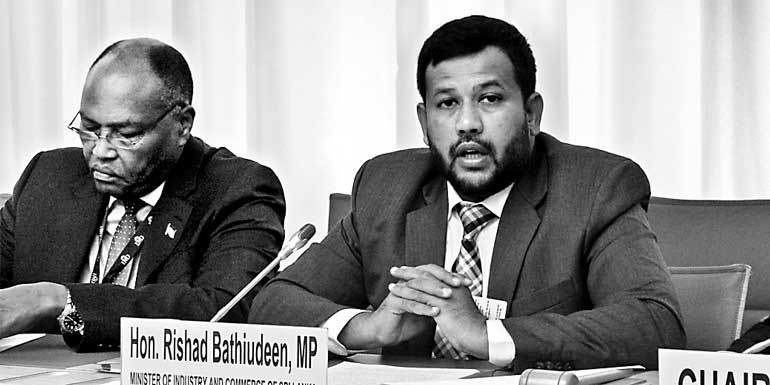Saturday Feb 07, 2026
Saturday Feb 07, 2026
Saturday, 5 November 2016 00:00 - - {{hitsCtrl.values.hits}}
 Minister of Industry and Commerce Rishad Bathiudeen (third from left) addresses the session on the fourth review of the Trade Policies and Practices of Sri Lanka at the Trade Policy Review in Geneva (presided by Irene Chairperson of the Trade Policy Review Body B. K. Young seated fourth from left) on 02 November.
Minister of Industry and Commerce Rishad Bathiudeen (third from left) addresses the session on the fourth review of the Trade Policies and Practices of Sri Lanka at the Trade Policy Review in Geneva (presided by Irene Chairperson of the Trade Policy Review Body B. K. Young seated fourth from left) on 02 November.
Sri Lanka owes its global debtors $65 billion while the lower tariffs have brought in formidable challenges – and any tariff adjustments are only a temporary measure. Sri Lanka also seeks flexibilities as well as Special and Differential Treatments during future Word Trade Organisation (WTO) negotiations.
“Despite Sri Lanka’s commitments to trade liberalisation, a lower tariff structure has forced formidable challenges to the Government, particularly with regard to its revenue sources,” Industry and Commerce Minister Rishad Bathiudeen said in Geneva on Wednesday, addressing the fourth Review of the trade policies and practices of Sri Lanka. The Review taking place from 01 to 03 November is on the basis of reports by the WTO Secretariat and by the Government of Sri Lanka.
In his lengthy submission to the Review session, Bathiudeen elaborated on Sri Lanka’s achievements in various development indicators and stressed the country’s commitment to WTO’s trade measures. “Developing its infrastructure to increase its economic potential has resulted in Sri Lanka’s reliance on foreign debt. The official estimate of what Sri Lanka currently owes its financiers is $65 billion. The country’s debt-to-GDP currently stands around 75% and a significant portion of all Government revenue is currently going towards debt repayment. As a result of the above, the Government started experiencing fiscal difficulties to meet with the country’s development as well as rehabilitating needs. With regard to import and export trade, Sri Lanka maintains a greater openness to international trade. While appreciating recent outcomes of multilateral negotiations and, in particular, outcomes of the Nairobi Ministerial where Sri Lanka looks forward to the effective implementation of decisions reached. Flexibilities through Special and Differential Treatments have been widely recognised for smaller economies during the DDA process. Further, the Ministerial Declaration of MC-10 made in Nairobi (Para 26) emphasised on such flexibilities for SVEs with the aim of facilitating their fuller integration into a multilateral trading system by taking into account the needs of SVEs in all areas of negotiations. Sri Lanka seeks such flexibilities and Special and Differential Treatments during the process of WTO future negotiations. With regard to tariffs, Sri Lanka’s bound commitments made to WTO are relatively at a lower level in both agriculture and non-agriculture products. With regard to applied rate, currently Sri Lanka maintains three bands tariffs at zero, 15% and 30%. Over 56% of tariff lines are at zero duty level. Out of the remaining tariff lines, a majority is confined to a lower bracket of tariff. Despite Sri Lanka’s commitments to trade liberalisation, a lower tariff structure has thrown formidable challenges at the Government in particular to the revenue sources. The global market slowdown and the fluctuation on the global demand for the commodities that Sri Lanka trades with have increased the country’s vulnerability to external pressures. I observed that many questions raised by the members of the WTO have also concentrated on these temporary measures. I wish to inform them this is a temporary phenomenon and those measures are not at the expense of our commitment to the multilateral trading system. At the same time, I solicit attention of the WTO Members to assess the development needs of the country as a small economy. While upholding the country’s commitments to the multilateral trading system, Sri Lanka will explore further opportunities for bilateral and regional trade with emerging economies. Sri Lanka aims at the effective implementation of trade facilitation. Sri Lanka, being a country open for trade, believes that minimising trade barriers and reducing transaction cost of trade are effective and efficient ways for future development. Sri Lanka has placed great importance on the adoption of the Trade Facilitation Agreement. Sri Lanka has ratified the Trade Facilitation Agreement and our Instrument of Acceptance has been submitted to the Director General of WTO on 31 May 2016. I am pleased to mention here that my country, in close liaison with the WTO, the World Bank Group, ITC, UNCTAD, the World Customs Organisation, UNIDO and the World Economic Forum, is working on an implementation program and our objective is to establish a productive trade facilitation program in the country with the assistance of the above international agencies and donor community.”
The 02 November Policy Review session was presided by Chairperson of the Trade Policy Review Body Irene B. K. Young.